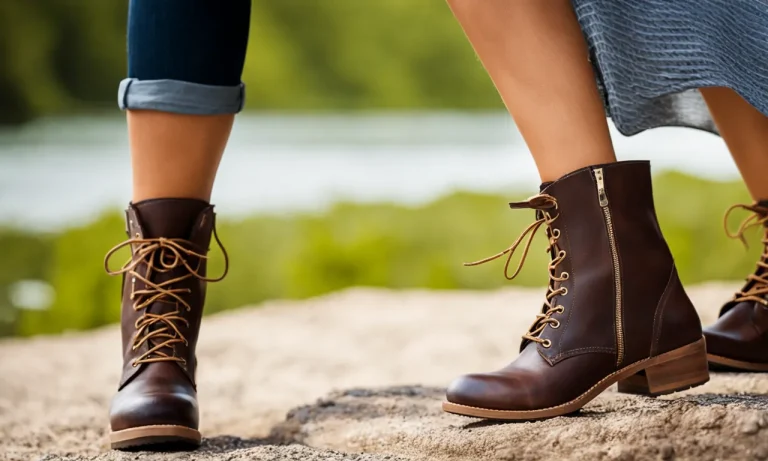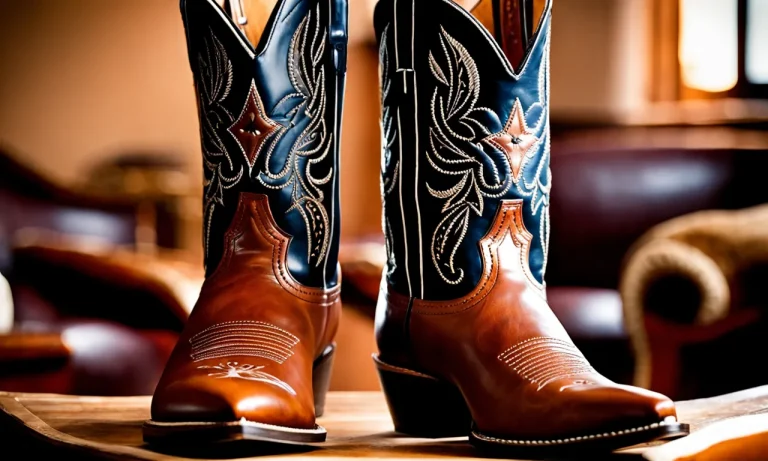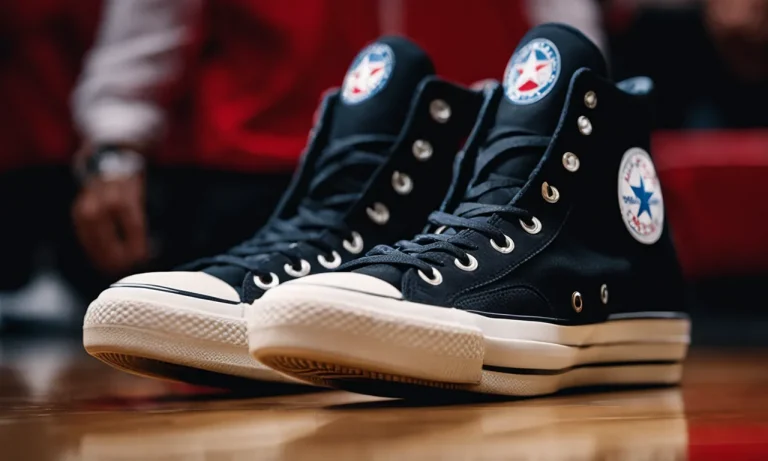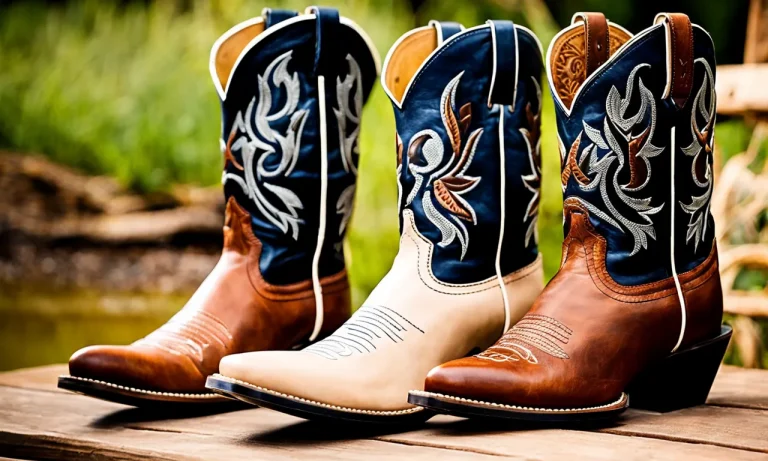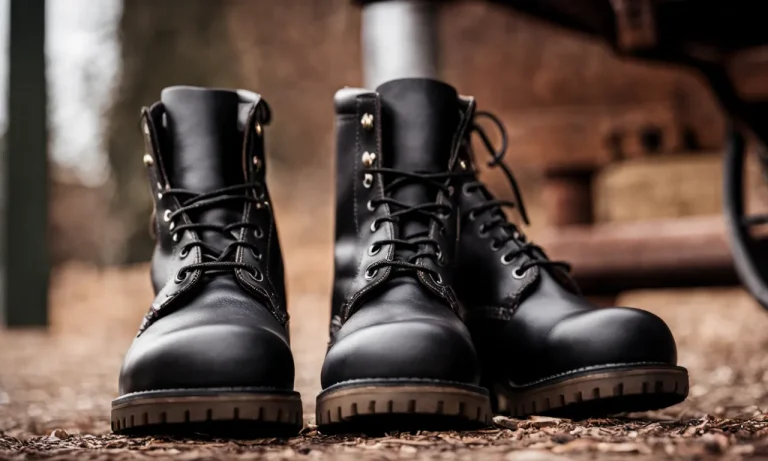If you’ve ever slipped on a pair of boots only to be hit with an overwhelming stench, you know how unpleasant smelly boots can be. Fortunately, there are plenty of ways to banish foul footwear odors and keep your boots smelling fresh.
If you’re short on time, here’s a quick answer to your question: stuff your boots with newspaper or baking soda when not wearing them and allow them to air out. Spraying them with vinegar or vodka can help kill bacteria.
You can also wash the removable insoles and use commercial boot deodorizing products.
In this comprehensive guide, we’ll outline everything you need to know to make your boots smell better. We’ll cover quick fixes like stuffing with newspaper, as well as deep cleaning methods to eliminate odors at their source.
Understand What Causes Boot Odor
Boot odor can be unpleasant and embarrassing, but understanding what causes it is the first step towards eliminating it. There are several factors that contribute to the unpleasant smell emanating from your boots.
Bacteria and Fungus Growth
One of the main culprits behind boot odor is the growth of bacteria and fungus. When your feet sweat, the moisture gets trapped inside your boots, creating a damp environment that is perfect for bacterial and fungal growth.
These microorganisms thrive in warm and humid conditions and can produce foul-smelling odors as they break down sweat and skin cells.
An effective way to combat bacteria and fungus growth is to regularly clean and dry your boots. Use a mild detergent and warm water to clean the interior of your boots, and then allow them to air dry completely before wearing them again.
Additionally, using antibacterial sprays or powders can help keep these microorganisms at bay.
Sweat
Sweat itself doesn’t have an odor, but when it comes into contact with bacteria on your skin, it can create an unpleasant smell. The sweat glands on your feet can produce a significant amount of moisture, especially during physical activity or in hot weather.
This excess moisture can seep into your boots, leading to a buildup of odor-causing bacteria.
To reduce sweat and minimize odor, consider wearing moisture-wicking socks made from materials like cotton or bamboo. These types of socks are designed to draw moisture away from your feet, keeping them dry and less prone to odor.
Additionally, changing your socks regularly throughout the day can help prevent excessive moisture buildup.
Dirty Socks
Wearing dirty socks is another common cause of boot odor. When you wear the same pair of socks multiple times without washing them, bacteria and sweat accumulate on the fabric. As a result, when you put on your boots, the combination of the dirty socks and the enclosed environment inside the boots can create quite a stench.
To prevent this, make sure to wash your socks regularly, especially if they are made from materials that tend to retain moisture. Opt for breathable socks that allow air to circulate around your feet, reducing the chances of odor-causing bacteria growth.
Wetness
Wetness, whether from rain, snow, or stepping into a puddle, can contribute to boot odor. When your boots get wet, they take longer to dry, providing a welcoming environment for bacteria and fungus to thrive. This can result in a damp and musty smell that is hard to get rid of.
To prevent wetness from causing odor in your boots, it’s important to dry them thoroughly whenever they get wet. Remove any insoles or inserts and allow them to air dry completely. If possible, use a fan or place them near a heat source to expedite the drying process.
Additionally, consider treating your boots with a waterproof spray to help repel moisture.
By understanding the causes of boot odor, you can take proactive steps to prevent it from occurring. Regularly cleaning your boots, wearing moisture-wicking socks, washing your socks regularly, and ensuring your boots are dry can go a long way in keeping them smelling fresh and pleasant.
Regular Maintenance to Prevent Smelly Boots
Smelly boots can be a real problem, especially if you wear them regularly. Fortunately, there are several simple maintenance steps you can take to prevent unpleasant odors from developing. By incorporating these practices into your boot care routine, you can keep your boots smelling fresh and clean for longer.
Let Boots Dry Completely Between Wears
One of the main causes of smelly boots is moisture buildup. When your boots don’t have a chance to dry out completely between wears, bacteria and fungi thrive in the damp environment, causing unpleasant odors. To prevent this, make sure to let your boots air dry thoroughly after each use.
Remove the insoles and laces, and place them in a well-ventilated area. Avoid storing your boots in a closed space or near a heat source, as this can promote bacterial growth.
Use Moisture Wicking Socks
Another effective way to prevent smelly boots is to wear moisture-wicking socks. These socks are specially designed to pull moisture away from your feet, keeping them dry and reducing the chance of odor-causing bacteria growth.
Look for socks made from materials like merino wool or synthetic blends that are specifically marketed as moisture-wicking. By investing in a few pairs of these socks, you can significantly reduce the likelihood of smelly boots.
Treat Boots with Baking Soda
Baking soda is a natural and effective odor absorber. To eliminate unpleasant smells from your boots, sprinkle some baking soda inside them and let it sit overnight. The baking soda will absorb any odors, leaving your boots smelling fresh.
In the morning, simply shake out the excess baking soda and wipe the insides of your boots clean. This simple trick is a great way to keep your boots smelling their best.
Use Commercial Boot Powders and Sprays
If you prefer a ready-made solution, there are plenty of commercial boot powders and sprays available on the market. These products are specifically formulated to eliminate odors and freshen up your boots.
Look for powders or sprays that contain ingredients like activated charcoal or tea tree oil, as these have natural deodorizing properties. Simply follow the instructions on the product label to use them effectively.
By following these regular maintenance practices, you can keep your boots smelling great and extend their lifespan. Remember, prevention is key when it comes to smelly boots, so be proactive in taking care of your footwear.
With a little effort, you can enjoy fresh-smelling boots every time you put them on.
Quick Fixes for Freshening Up Stinky Boots
Stuff with Newspaper
One quick and easy way to freshen up your stinky boots is by stuffing them with newspaper. Newspaper acts as an absorbent, soaking up any moisture or odor trapped inside your boots. Simply crumple up a few sheets of newspaper and stuff them tightly into your boots.
Leave them overnight or for a few days, and the newspaper will help to eliminate any unpleasant smells.
Spray with Vinegar or Vodka
If the smell in your boots is particularly stubborn, you can try spraying them with vinegar or vodka. Both of these household items have natural deodorizing properties that can help eliminate odors. Mix equal parts water and vinegar or vodka in a spray bottle, and spray the inside of your boots.
Allow them to air dry, and the vinegar or vodka will help neutralize the odor-causing bacteria. Just make sure to let your boots dry completely before wearing them again.
Air Out in Sunlight
Sunlight is a natural deodorizer and can help freshen up your boots. Take your stinky boots outside and place them in direct sunlight for a few hours. The UV rays from the sun will help kill any bacteria causing the odor and will also help to dry out any moisture.
This method is especially effective for boots that have been exposed to sweat or dampness.
Place in Freezer Overnight
Believe it or not, freezing your boots can also help eliminate odors. Place your boots in a plastic bag and seal it tightly. Then, place the bag in the freezer overnight. The extreme cold will kill any odor-causing bacteria, leaving your boots smelling fresher.
Just remember to let your boots thaw and dry before wearing them again.
Pro Tip: To prevent future odors, make sure to keep your boots clean and dry. Regularly clean the insides of your boots with a mixture of mild soap and water, and allow them to air dry completely before storing them.
Additionally, wearing moisture-wicking socks can help reduce sweat and moisture buildup in your boots.
For more information on how to keep your boots smelling great, you can visit BootMoodFoot.com, a website dedicated to providing helpful tips and advice on boot care and maintenance.
Deep Cleaning Methods for Severely Smelly Boots
If you’ve been struggling with the unpleasant odor coming from your boots, it’s time to take action and give them a deep clean. Here are some effective methods to tackle even the most severe cases of smelly boots.
1. Wash Removable Insoles
One of the main culprits of boot odor is the insoles. Over time, they can absorb sweat and bacteria, leading to a foul smell. To combat this, remove the insoles from your boots and give them a thorough wash. Use mild soap and warm water to clean them, and let them air dry completely before placing them back in your boots.
This simple step can make a significant difference in eliminating odor.
2. Use a Boot Dryer
A boot dryer is a handy tool for not only drying wet boots but also eliminating odor-causing bacteria. Place your boots on the dryer and let it work its magic. The warm air will help evaporate any moisture trapped inside the boots, preventing the growth of odor-causing bacteria.
Regular use of a boot dryer can keep your boots smelling fresh and clean.
3. Clean Interior with Baking Soda and Vinegar
Baking soda and vinegar are powerful natural deodorizers that can work wonders on smelly boots. Start by sprinkling a generous amount of baking soda inside the boots, making sure to cover the entire interior. Let it sit overnight to absorb any unpleasant odors.
The next day, wipe out the baking soda and spray the interior with a mixture of equal parts water and vinegar. This combination will not only neutralize odors but also kill any bacteria lingering in your boots.
4. Disinfect with Tea Tree Oil
Tea tree oil is known for its antimicrobial properties, making it an excellent choice for disinfecting smelly boots. Mix a few drops of tea tree oil with water and use a cloth or sponge to wipe down the interior of your boots. This will help kill any bacteria that may be causing the odor.
Additionally, tea tree oil has a refreshing scent that will leave your boots smelling great.
Remember, prevention is key to keeping your boots smelling fresh. Regularly airing them out, using odor-absorbing inserts, and keeping your feet clean and dry will go a long way in preventing odor buildup.
With these deep cleaning methods and a little bit of maintenance, you can say goodbye to smelly boots for good.
When to Consider Replacing Your Boots
While it’s normal for boots to show signs of wear and tear over time, there are certain situations where replacing them is the best course of action. Here are a few key indicators that it may be time to invest in a new pair of boots:
Odor Persists After Cleaning
If you’ve tried various methods to eliminate the unpleasant odor coming from your boots, but it still persists, it might be a sign that it’s time to replace them. Persistent odor can indicate that the materials in your boots have deteriorated beyond repair.
Additionally, it could be a sign of bacteria or mold growth that has penetrated deep into the fabric or leather.
Visible Mold Growth
Mold growth is not only unsightly but can also pose a health risk. If you notice visible mold growth on your boots, it’s crucial to address the issue promptly. Cleaning and disinfecting the boots might help in some cases, but if the mold has spread extensively or has penetrated the inner layers of the boots, it’s advisable to replace them.
Mold can weaken the structure of the boots and compromise their integrity, making them less effective in protecting your feet.
Boots Are Worn Out
Over time, boots can start to show signs of wear and tear, such as cracked soles, frayed stitching, or significant scuffing. These signs indicate that the boots have reached the end of their lifespan and may no longer provide the necessary support and protection.
Continuing to wear worn-out boots can lead to discomfort, foot pain, and even injuries. It’s important to prioritize your safety and invest in a new pair of boots when they are no longer in good condition.
Remember, knowing when to replace your boots is essential for maintaining foot health, comfort, and overall performance. If you’re unsure whether it’s time to say goodbye to your old boots, consult with a professional or trusted footwear specialist to get their expert opinion.
Conclusion
Smelly boots are a common problem, but armed with the right knowledge, you can keep your footwear fresh. Focus on allowing boots to dry out completely between wears, using moisture wicking socks, and treating with commercial deodorizing products.
For quick odor relief, stuff with newspaper or spray with vinegar. For severe cases, deep clean the interior and wash removable insoles. If smells persist even after thorough cleaning, it may be time to replace your well-worn boots with a fresh new pair.

